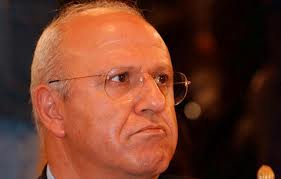
The arrest and indictment of Lebanon’s former information minister, Michel Samaha, on suspicion of plotting to assassinate political and religious figures in co-ordination with Syria’s security bureau chief has sent shockwaves through the domestic political scene.
It is difficult to overemphasise the significance of Samaha’s case, because the former minister is one of the most enthusiastic cheerleaders for the regime of Syria’s President Bashar al-Assad.
Lebanon is intricately linked to Syria. Pre-existing divisions in Lebanese politics between pro- and anti-Assad politicians have crystallised as the Syrian uprising has progressed, to the chagrin of the international community and the obvious detriment of civilians in border areas.
So when a prominent and outspoken Assad sympathiser gets arrested on terrorism charges, it is not merely a security issue. Samaha belongs to the 8 March bloc largely supportive of the Syrian president. It is made up of several parties, the most prominent of which is Hezbollah.
Samaha’s arrest was carried out by the Internal Security Forces (ISF), a department largely accepted to be under the influence of Sunni political groups. Its head, Ashraf Rifi, has very close links to Saudi Arabia.
A pro-Assad politician allied to Shia Hezbollah arrested by a Sunni, anti-Assad police brigade? Things like this don’t end well in Lebanon. The last time something as potentially disruptive to the country’s delicate sectarian balance occurred, in May 2008, street battles raged for several days. Dozens were killed.
This time around, as Lebanon braced itself for the violent fallout of Samaha’s arrest, something strange happened: nothing. The expected backlash from fellow Assad supporters in Lebanon (and there are many) never came.
The reasons behind Hezbollah’s restraint are straightforward, if a little unexpected. The party is not, as is commonly supposed, strategically allied to Assad (even if it may be so politically). For all the gossip that Hezbollah fighters are operating alongside pro-government gangs in Syria, its military arm has steadfastly refused to get drawn into conflicts within Lebanon concerning the Syria crisis.
When pro- and anti-Assad gangs clashed in Beirut and Tripoli in May, Hezbollah played an uncharacteristic peacekeeping role by facilitating the evacuation of a besieged militia leader.
Hezbollah admits to communicating with the Syrian opposition. The party even distanced itself from remarks made with characteristic bombast by its politburo chief, Mohammad Raad, who sprung to Samaha’s defence and accused the ISF of being politically motivated. These are hardly the actions of a party that will live or die by Assad’s side.
 Hezbollah may prefer his regime to the alternatives but it gets directives and funding from Iran, not Syria. For sure, the fall of a friendly regime would inconvenience Hezbollah. But an inconvenience is not worth tearing Lebanon apart for, and Hezbollah seems to understand this.
Hezbollah may prefer his regime to the alternatives but it gets directives and funding from Iran, not Syria. For sure, the fall of a friendly regime would inconvenience Hezbollah. But an inconvenience is not worth tearing Lebanon apart for, and Hezbollah seems to understand this.
In addition, Hezbollah, perhaps for the first time in its history, finds itself in a position of virtually unchallenged influence in Lebanon. It belongs to the government. It enjoys an arsenal and fighting force far outstripping that of the state. There is a general election coming in 2013 and Hezbollah is quite happy with the makeup of the country as it is.
Syria called the shots in Lebanon for more than three decades before its armed presence there was ended in 2005. It has been accused of continuing to perform assassinations in Lebanon and, if the charges against Samaha prove correct, it has been caught doing so. If Samaha is found guilty, Assad will be directly implicated. This, clearly, is a red line that not even Hezbollah is willing to see flouted.
If the government in Damascus is proved to have been trying to export Syria’s crisis to Lebanon, it will be seen as yet another miscalculation by a regime that is alienating even its staunchest traditional partisans.
Meanwhile, a Lebanese government composed almost exclusively of Assad sympathisers seems curiously content to see one of his biggest supporters go hang.
Guardian.co.uk

Leave a Reply
You must be logged in to post a comment.